 Malaysia Festivals
Malaysia certainly has many colors which make it appear lively and vibrant, each time you take a look. Perhaps it is the only place in the world with numerous religious holidays on its calendar. For the maximum religious festivals, it observes an open-door policy in which people invite friends and relatives regardless of their faith. The multi-ethnic and multi-religious facets of the country are best seen in the celebration of various festivals that are observed with whole-hearted festivities. Malaysian festivals are generally celebrated nationwide, but sometimes, they are observed at state level. Nearly all religious festivals are celebrated according to the lunar calendar, so the dates get changed every year. Given below are the major festivals commemorated in Malaysia.
Chinese New Year.jpg)
Amongst the Chinese, the Chinese New Year is the most important annual festival which is observed with many rituals and customs. Lasts for complete 2 weeks, Chinese New Year is celebrated with high spirits in Malaysia too. It is celebrated according to the Chinese Lunar Calendar that was invented around 300 BC.
Hari Raya Puasa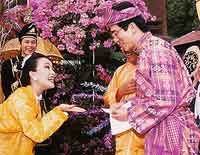
Essentially a Malay term for Eid-ul-fitr, Hari Raya Puasa literally means "Celebration Day of Fasting". This joyous occasion falls on the 1st day of Syawal, the Muslim month. Also called Hari Raya Aidilfitri, it marks the successful completion of fasting during Ramadhan - the ninth month of Islamic Calendar.
Thaipusam 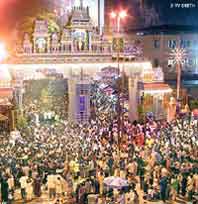
Celebrated largely by the Tamil population, Thaipusam is an important Hindu festival. Like other festivals, Thaipusam too, is celebrated with zeal and fervor in Malaysia. Observed on the full moon of Tamil month - Thai (Jan/Feb), it is marked as a day for penance and atonement among the Hindus.
Deepavali
Signifying the triumph of good over evil, Deepawali is the 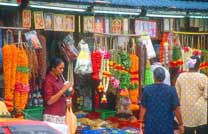 major festival of the Hindus. People light oil-lamps in their houses to mark the occasion. On the festival eve, people perform rituals and prayers at their homes and temples. Along with all this, different delicacies are made at homes. In Malaysia, people observe the event by open-house invitations to friends and relatives. major festival of the Hindus. People light oil-lamps in their houses to mark the occasion. On the festival eve, people perform rituals and prayers at their homes and temples. Along with all this, different delicacies are made at homes. In Malaysia, people observe the event by open-house invitations to friends and relatives.
Tadau Kaamatan (Harvest Festival).jpg)
In Sabah, the aboriginal tribes of Kadazan, Dusun and Murut commemorate their harvest festival in May. At the occasion, offerings are made to the spirit of paddy, Bambaazon. Tapai (rice wine) is liberally consumed throughout the event. Partying usually involves agricultural shows, exhibitions, cultural programs, buffalo races and other customary games.
Christmas
 Christmas, the birth of Jesus Christ, is observed by Christians in Malaysia. In the typical style, homes are adorned with decorations, colored lights accompanied by the Christmas tree. Amongst the youngsters, caroling starts days before the big day to usher in the Yuletide spirit. Like other festivals, 'open-house' is observed on the gazetted holiday. Christmas, the birth of Jesus Christ, is observed by Christians in Malaysia. In the typical style, homes are adorned with decorations, colored lights accompanied by the Christmas tree. Amongst the youngsters, caroling starts days before the big day to usher in the Yuletide spirit. Like other festivals, 'open-house' is observed on the gazetted holiday.
Hungry Ghost Festival
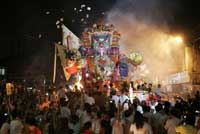 Hungry Ghost Festival is said to be the day when the gates of hell gets open to release the hungry ghosts, according to the Chinese belief. It is observed on the 15th day of the seventh lunar month by the Buddhists and the Taoists. On this day, people remember their deceased family members and make offerings to ward off bad luck. Hungry Ghost Festival is said to be the day when the gates of hell gets open to release the hungry ghosts, according to the Chinese belief. It is observed on the 15th day of the seventh lunar month by the Buddhists and the Taoists. On this day, people remember their deceased family members and make offerings to ward off bad luck.
Lantern & Mooncake Festival (Tang Lung)
.jpg) Lantern and Mooncake Festival is celebrated by the Chinese throughout Malaysia. Signifies celebration of peace and shared prosperity, the event is marked by lighting of lanterns and enjoying the scrumptious variety of mooncakes. All over the country, these cakes are available as round pastries usually filled with a mixture of sweet red bean paste or lotus nut paste. Lantern and Mooncake Festival is celebrated by the Chinese throughout Malaysia. Signifies celebration of peace and shared prosperity, the event is marked by lighting of lanterns and enjoying the scrumptious variety of mooncakes. All over the country, these cakes are available as round pastries usually filled with a mixture of sweet red bean paste or lotus nut paste.
Thaiponggol
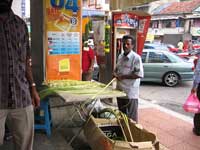 Celebrated by Tamils, Thaiponggol is a harvest festival that falls somewhere in the second week of January. On this day, farmers get up early in the morning and cook the newly harvested grain to offer the meal to the sun. In urban families, scenario is a bit changed and involves rising, bathing and getting dressed up before dawn. Then lamps are lit and offerings are made to the God. Celebrated by Tamils, Thaiponggol is a harvest festival that falls somewhere in the second week of January. On this day, farmers get up early in the morning and cook the newly harvested grain to offer the meal to the sun. In urban families, scenario is a bit changed and involves rising, bathing and getting dressed up before dawn. Then lamps are lit and offerings are made to the God.
National Water Festival
 Water is of great importance in Malaysian culture, where it serves as a communication system and an economic resource representing the early settlement. With a message of protection and utilization, National Water Festival is celebrated in Malaysia. Tapai, an alcoholic drink made of rice wine, is liberally served on the occasion. Water is of great importance in Malaysian culture, where it serves as a communication system and an economic resource representing the early settlement. With a message of protection and utilization, National Water Festival is celebrated in Malaysia. Tapai, an alcoholic drink made of rice wine, is liberally served on the occasion.
Wesak Day
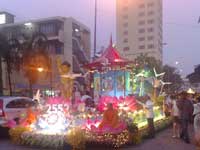 Observed by the Buddhists, Wesak Day commemorates the three big events of Buddha's life - Birthday, Enlightenment and Achievement of Nirvana. On the day, devotees assemble at the temples to meditate on the eight precepts of Buddha. Wesak Day falls in May and donations, prayers and chanting make the special part of the occasion. Observed by the Buddhists, Wesak Day commemorates the three big events of Buddha's life - Birthday, Enlightenment and Achievement of Nirvana. On the day, devotees assemble at the temples to meditate on the eight precepts of Buddha. Wesak Day falls in May and donations, prayers and chanting make the special part of the occasion.
|







.jpg)


 major festival of the Hindus. People light oil-lamps in their houses to mark the occasion. On the festival eve, people perform rituals and prayers at their homes and temples. Along with all this, different delicacies are made at homes. In Malaysia, people observe the event by open-house invitations to friends and relatives.
major festival of the Hindus. People light oil-lamps in their houses to mark the occasion. On the festival eve, people perform rituals and prayers at their homes and temples. Along with all this, different delicacies are made at homes. In Malaysia, people observe the event by open-house invitations to friends and relatives. .jpg)
 Christmas, the birth of Jesus Christ, is observed by Christians in Malaysia. In the typical style, homes are adorned with decorations, colored lights accompanied by the Christmas tree. Amongst the youngsters, caroling starts days before the big day to usher in the Yuletide spirit. Like other festivals, 'open-house' is observed on the gazetted holiday.
Christmas, the birth of Jesus Christ, is observed by Christians in Malaysia. In the typical style, homes are adorned with decorations, colored lights accompanied by the Christmas tree. Amongst the youngsters, caroling starts days before the big day to usher in the Yuletide spirit. Like other festivals, 'open-house' is observed on the gazetted holiday.  Hungry Ghost Festival is said to be the day when the gates of hell gets open to release the hungry ghosts, according to the Chinese belief. It is observed on the 15th day of the seventh lunar month by the Buddhists and the Taoists. On this day, people remember their deceased family members and make offerings to ward off bad luck.
Hungry Ghost Festival is said to be the day when the gates of hell gets open to release the hungry ghosts, according to the Chinese belief. It is observed on the 15th day of the seventh lunar month by the Buddhists and the Taoists. On this day, people remember their deceased family members and make offerings to ward off bad luck. .jpg) Lantern and Mooncake Festival is celebrated by the Chinese throughout Malaysia. Signifies celebration of peace and shared prosperity, the event is marked by lighting of lanterns and enjoying the scrumptious variety of mooncakes. All over the country, these cakes are available as round pastries usually filled with a mixture of sweet red bean paste or lotus nut paste.
Lantern and Mooncake Festival is celebrated by the Chinese throughout Malaysia. Signifies celebration of peace and shared prosperity, the event is marked by lighting of lanterns and enjoying the scrumptious variety of mooncakes. All over the country, these cakes are available as round pastries usually filled with a mixture of sweet red bean paste or lotus nut paste.  Celebrated by Tamils, Thaiponggol is a harvest festival that falls somewhere in the second week of January. On this day, farmers get up early in the morning and cook the newly harvested grain to offer the meal to the sun. In urban families, scenario is a bit changed and involves rising, bathing and getting dressed up before dawn. Then lamps are lit and offerings are made to the God.
Celebrated by Tamils, Thaiponggol is a harvest festival that falls somewhere in the second week of January. On this day, farmers get up early in the morning and cook the newly harvested grain to offer the meal to the sun. In urban families, scenario is a bit changed and involves rising, bathing and getting dressed up before dawn. Then lamps are lit and offerings are made to the God.  Water is of great importance in Malaysian culture, where it serves as a communication system and an economic resource representing the early settlement. With a message of protection and utilization, National Water Festival is celebrated in Malaysia. Tapai, an alcoholic drink made of rice wine, is liberally served on the occasion.
Water is of great importance in Malaysian culture, where it serves as a communication system and an economic resource representing the early settlement. With a message of protection and utilization, National Water Festival is celebrated in Malaysia. Tapai, an alcoholic drink made of rice wine, is liberally served on the occasion.  Observed by the Buddhists, Wesak Day commemorates the three big events of Buddha's life - Birthday, Enlightenment and Achievement of Nirvana. On the day, devotees assemble at the temples to meditate on the eight precepts of Buddha. Wesak Day falls in May and donations, prayers and chanting make the special part of the occasion.
Observed by the Buddhists, Wesak Day commemorates the three big events of Buddha's life - Birthday, Enlightenment and Achievement of Nirvana. On the day, devotees assemble at the temples to meditate on the eight precepts of Buddha. Wesak Day falls in May and donations, prayers and chanting make the special part of the occasion.